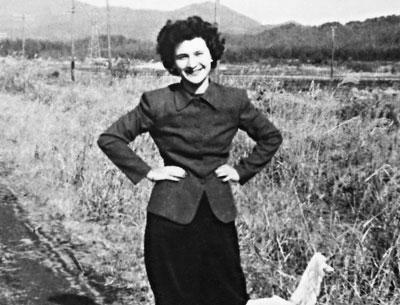Beate Gordon, Early Feminist

Beate Sirota Gordon, the author of the key women’s rights aspects in the post-war Japanese Constitution, died of pancreatic cancer at home in Manhattan on Dec. 30. She was 89.
Ms. Gordon, who had summered in Amagansett since about 1990, was attracted to the South Fork by its art scene. “She had dear friends in the arts community,” her grandson Sam Gordon said.
A gifted linguist who spoke six languages, she was born in Vienna, Austria, on Oct. 25, 1923, to Leo Sirota and the former Augustine Horenstein.
Her father was a renowned classical concert pianist and, during a tour of Japan, fell in love with the country. With the threat of Nazi Germany growing, the Sirota family emigrated from Austria to Japan in 1928.
Living in Tokyo, Ms. Gordon first began studying at a German school, but her parents pulled her out as the Nazi influence over the school increased, transferring her to an American school in the Japanese capital when she was 12.
Her gift for language was apparent from a young age, and she was admitted to Mills College in Oakland, Calif., at the age of 15 in 1939, studying modern languages, and graduating in 1943.
By that time the United States was at war with Japan, and from the start of the war until its conclusion, she had no contact with her parents.
She comfortably spoke German, English, Russian, French, Spanish, and Japanese. At the end of World War II, wanting desperately to reconnect with her parents, she became an interpreter for the Army of Occupation’s executive staff in 1945. She discovered her parents had made it through the war, malnourished but unhurt.
When the new Japanese constitution was being written in secret by General Douglas MacArthur’s staff, though she was then only 22, she was asked to write its women’s rights section, which still stands today. In all, the draft took seven days to produce, with Ms. Gordon the only woman among a group of some 24 men.
Her future husband, Joseph Gordon, was chief translator and interpreter for the U.S. military intelligence. They married in January 1948 and remained together until Mr. Gordon’s death in August.
The couple had two children, Nicole Gordon and Geoffrey Gordon, both of New York City.
She joined the Japan Society in 1954, becoming its director of performing arts in 1958. She became director of performing arts for the Asia Society in 1970.
In these roles, she became involved in bringing new artists and performers from Japan and Asia to the States, as well as working with American performing artists.
Some of the personalities and performers she worked with in their early years were Yoko Ono, John Cage, and Robert Wilson.
In 1995, her memoir, “The Only Woman in the Room,” was released in Japan, becoming a best-seller there, and made her a cultural celebrity. The English-language edition was released two years later. In 1998, Ms. Gordon was awarded the Order of the Sacred Treasure by the Japanese government, according to an obituary for her that appeared in The New York Times.
Besides her two children and Mr. Gordon, she is survived by two other grandchildren.
A memorial for her will be held at the Asia Society at a date to be announced.
The family asked that donations in her memory be made to her alma mater, Mills College, 5000 MacArthur Boulevard, Oakland, Calif. 94605.
